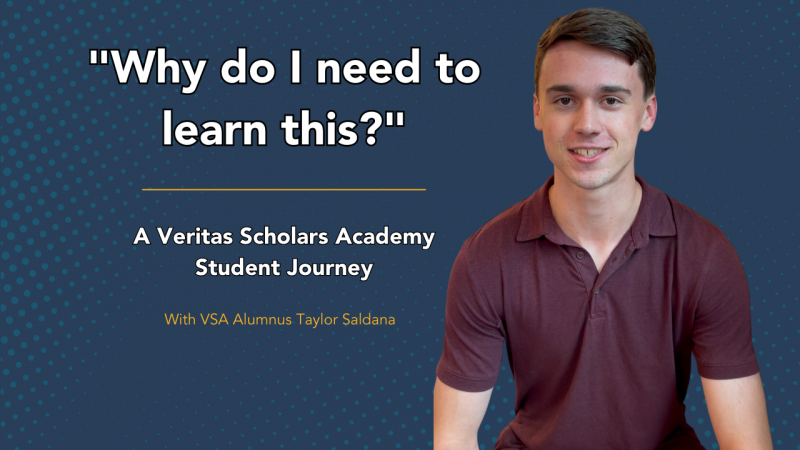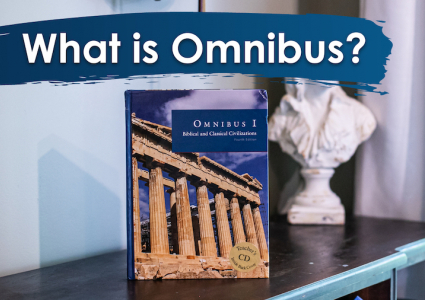"Why do I need to learn this?" A Veritas Student Journey | Taylor Saldana

Meet Veritas Scholars Academy alumnus, Taylor Saldana. Like many students, he has wrestled with the “Why do I need to learn that if it’s not what I want to go into?” question. Over time, he has come to realize why a classical liberal arts education is beneficial - even to the STEM career he is pursuing.
Watch the video below to hear in his own words why he joined Veritas Scholars Academy, what he has gained from his time here, how the liberal arts influence people in the STEM world, and what advice he has to offer to high school students and those who are joining VSA for the first time.
Transcription
Note: This transcription may vary from the words used in the original episode for better readability.
When did you join Veritas Scholars Academy?
So last year was actually my first year as a junior. I came from a classical Christian private school like a brick-and-mortar school in our area.
How was your transition to VSA?
It honestly felt pretty smooth because the school I came from was similarly rigorous.
Why did you leave private school?
We just started to feel more government control, especially in public schools, but also even the private schools, and the woke influence just kind of started seeping in. It didn't seem possible in the school that we were in; it just seemed like a solid Christian school. But I guess that it just happened, especially in such a liberal state like California. I mean it was inevitable, I guess, that something like the woke agenda was going to start seeping in.
What are you planning to major in?
I'm going to be majoring in physics, and then hopefully I want to get an MBA after, so it's like two very different things. But there are three main reasons I want to do physics and then get an MBA. First, it's just that it's fun for me, it's my favorite subject, and it just clicks. I just love the problem-solving aspect of it.
Second, it's like arguably the hardest major you could do, and just the way I am, I always want to do the hardest thing I possibly can because it's rewarding and fun for me. Third, physics especially trains you to think; it trains you not only just what, but also how to apply that, and so that's something that a lot of jobs look for, not necessarily exactly what you're studying because you might not be applying physics until a business environment. Almost certainly, you're not. But that problem-solving ability is something that a lot of people look for and is very respected. So going into an MBA after, I think, is going to prepare me well for any sort of business environment that I might want to go into.
How does classical education influence your major?
A lot of it's funny because when we toured the colleges and looked at the physics departments, especially schools around us, I don't know, everywhere really, a lot of the people going into physics are so single-minded. They just aren't well-rounded at all. The people who want to major in physics really, that's all they've done their whole life. They've only gone outside. They just haven't done anything fun. They don't play sports, they don't play instruments, they don't really do anything other than just study, and that's just not fun. I don't know; I just like that even though reading might not be my favorite and I might not enjoy Omnibus as much as maybe calculus and physics, it makes you so much more well-rounded, and it's just such a better experience. You get to actually socialize with people and make friends instead of just locking yourself in your room and just taking a test and studying all day, which I think is so much more fun.
What advice would you give to new VSA students?
I would say regardless of what you're going into, treat every class as equally important, and just because you might not like Omnibus or, for someone who's different than me, let's say you love Omnibus but you don't like math and physics, it doesn't mean you should just ignore it and just read the books because you still want to train that problem-solving part. So like if you treat all of your classes with respect and actually try, then not only are you going to be more well-rounded and more knowledgeable in the public setting later on in life, but you're just going to have more fun, and it's just going to be so much more enjoyable. You're not going to feel bottlenecked if you do try to change your mind; it's just going to be a lot better experience later on, I think.





